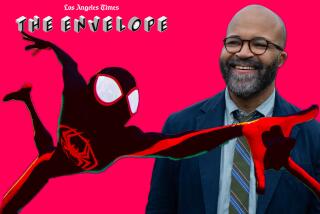CARY GRANT: MAN FOR ALL CLASSES
- Share via
It is the last, great gift that a half-century’s worth of admirers would have wished for Cary Grant that he might leave us, as he did late Saturday, at full stride, his energies, his intelligence and his matchless grin intact to the last hours of his life.
More than anyone else in his long stretch of film history, Grant excited awe and a kind of tongue-tying respect among those who themselves cause ripples when they enter a room and stop traffic when they are glimpsed in public.
I remember a raw late-year day in the 1960s in England when Grant strode, windblown and damp, into the commissary at Shepperton Studios. (He seemed to stride, even when he was walking like lesser men.) A hush fell over the room; sentences trailed off and forks paused in mid-air. He spotted his lunch guest and moved into the room, seemingly unaware of the impact he had had; lunch went on.
There was never anyone else quite like him. Cary Grant was in effect a one-man class, which cut across all the others from top to bottom. He was indubitably English and yet he transcended national boundaries. In a sense he was stateless as well as classless (in the classiest possible way).
He was the pluperfect romantic leading man, but he could play the raffish scoundrel (found to be good deep down) as well. He was able to move from farce to high drama, playing the adorable fool in “Bringing Up Baby” and a working-class man of great dramatic power in “None But the Lonely Heart.” He brought so persuasive a naturalness to his work that it was easy to overlook what a gifted and consistent actor he became.
There have been other debonair screen heroes, though none more debonair than Grant and none who could be at the same time so reassuringly solid, strong and unfoppish.
I wrote once about running into him at a Malibu party for Margot Fonteyn and Rudolph Nureyev in the mid-’60s. Toward 3 in the morning, we were watching Shirley MacLaine frugging with Nureyev to a rock quartet in the host’s living room.
“I don’t know,” Grant said. “When I dance with a girl I like to hold her. That’s the pleasure of it.” He watched a while longer and added, with great conviction, “And bucket seats! Bucket seats are an abomination!”
It was an unscripted moment, yet it might have come from one of his films and it suggested how nicely nature and the writer’s art had come together in so many of the roles he played. Indeed it was possible to think, in that urbane and amusing moment among the rich and famous, that to a remarkable degree the vaudeville juggler and dancer named Archie Leach out of Bristol, England, had been created by the roles he played quite as much as he had created them.
He was the supreme romantic figure, and yet he held on to the respect (as well as the boundless envy) of the men even as he was wowing the women. What the men may have envied and admired as much as Grant’s romantic appeal was his ability to move with such easy and graceful nonchalance through any situation on any rung of society’s sagging ladder. It often seems life’s hardest trick. And even when he was playing the fool, he somehow held on to an inner, untouchable core of dignity, which is also a neat trick in anybody’s life.
Grant’s steadfast refusal, after “Walk, Don’t Run” in 1966, to appear in any more movies probably caused more anguish than any retirement in Hollywood history, and producers and writers beyond counting dreamed of the property that would lure him back in front of the camera.
But, with the self-knowledge that was clearly part of his private persona, Grant refused all offers, determined not to look like a romantic anachronism. He stood his ground, and, despite “Ragtime,” it is possible to wish that James Cagney had been as steadfast.
Grant was the final and perfect proof that the most durable and deeply embraced stars are those who most conspicuously embody our most fervent and wistful dreams for ourselves. In Grant it was in part those robust good looks, that intimate baritone voice and the perceived sense that the man you saw on camera was not drastically unlike the charming and courteous fellow you might, with insane good luck, meet offscreen.
Above all--and here it does appear that the public and private man were one--there was Cary Grant, the cosmopolitan man for all classes moving with unselfconscious elegance through a world he found amusing and exciting to the end of his ageless days.
More to Read
Only good movies
Get the Indie Focus newsletter, Mark Olsen's weekly guide to the world of cinema.
You may occasionally receive promotional content from the Los Angeles Times.










